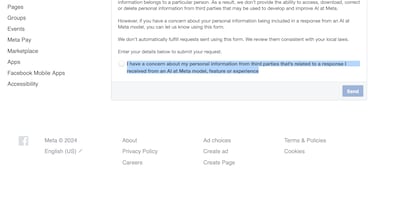Though you may be tired of the artificial intelligence hype and increasingly prevalent AI features, avoiding it – and protecting your data from it – is increasingly difficult, experts say.
Robert Wahl, an associate professor of computer science at Concordia University Wisconsin, said AI is often foisted on people and that the difficulty in avoiding iterations of AI runs contrary to recent polling that suggests apprehension about the technology.
“It may be that we will always have a percentage of consumers that either do not want artificial intelligence information, or at a minimum want to be given the choice on whether they receive artificial intelligence information,” he said. Prof Wahl pointed out that it is often incredibly difficult and in some cases impossible to opt out of AI features, as more and more companies try to secure their future through the technology.
“Many companies want to include AI features because of all the attention that AI is currently getting,” he said. “The perception may be that a reference to artificial intelligence on a website may lead to increased sales and help drive revenue.”
He added that he recently tried to turn off Google's much-vaunted “AI Overviews” feature, which provides users with summarised, AI-generated answers to various questions near the top of their search results. “I wasn't able to locate an easy way to opt out,” he said.
According to Google, although there are some ways for developers to minimise “AI Overviews” in some areas, there is no way for the average user to turn off the feature. “AI Overviews are part of Google Search like other features, such as knowledge panels, and can't be turned off,” a question and answer page provided by Google explains.
Prof Wahl also said figuring out how to turn off AI features on various tools, websites and apps can be difficult – and that's no accident. Companies want the AI tools to be used, tested and improved quickly, he said, and the fear of losing the competitive edge is turning consumer choice into an afterthought.
“It seems that the fairest way to proceed with the roll-out of artificial intelligence is to give consumers the ability to 'opt in' rather than having to 'opt out' from every application or website that uses it,” he said, noting that so far, those options have been the exception rather than the rule.
Opting out of AI data training: what doesn't work
Another issue is the use of social media content being used to train AI large language models. If you use Instagram or Facebook for any length of time, it is almost inevitable that you will come across a post purporting to forbid Meta – parent company of Instagram and Facebook – from using the data to train its AI products.
“I own the copyright to all images and posts submitted to my Instagram profile and therefore do not consent to Meta or other companies using them to train AI platforms,” the posts often read. Most technology and legal experts say the many versions of this slide being used cannot stop your content from being used to train AI.
Making accounts private through the app settings can give some protection. Often, the fine print of user agreements gives platform owners a lot of flexibility in terms of how content and data are used.
Prof Wahl points out that US laws are generally weaker than EU laws in the technology and data space. As a result, it is much easier to find settings to opt out of use of content for AI training on sites in European countries. In some instances, users were sent a notification with an option to opt out. For Instagram and Facebook in the US, however, no such option exists.
“If you have a concern about your personal information being included in a response from an AI at Meta model, you can let us know using this form,” reads a section of Facebook's privacy help centre for US users. “We don’t automatically fulfil requests sent using this form. We review them consistent with your local laws.”
Prof Wahl said that currently, and especially in the US, users do not have much leverage when it comes to getting options to opt out of AI. Time and user annoyance, he explained, may eventually change that.
“What seems to happen typically with emerging technology is that it is initially unregulated until enough problems are observed, and then governments step in and put regulations in place to protect consumers,” he said. For now, however, he said there is a tremendous burden on users to try to figure out difficult and often buried AI privacy settings or opt-out forms – with no guarantee of success.
Players Selected for La Liga Trials
U18 Age Group
Name: Ahmed Salam (Malaga)
Position: Right Wing
Nationality: Jordanian
Name: Yahia Iraqi (Malaga)
Position: Left Wing
Nationality: Morocco
Name: Mohammed Bouherrafa (Almeria)
Position: Centre-Midfield
Nationality: French
Name: Mohammed Rajeh (Cadiz)
Position: Striker
Nationality: Jordanian
U16 Age Group
Name: Mehdi Elkhamlichi (Malaga)
Position: Lead Striker
Nationality: Morocco
UAE currency: the story behind the money in your pockets
Specs
Engine: 51.5kW electric motor
Range: 400km
Power: 134bhp
Torque: 175Nm
Price: From Dh98,800
Available: Now
What the law says
Micro-retirement is not a recognised concept or employment status under Federal Decree Law No. 33 of 2021 on the Regulation of Labour Relations (as amended) (UAE Labour Law). As such, it reflects a voluntary work-life balance practice, rather than a recognised legal employment category, according to Dilini Loku, senior associate for law firm Gateley Middle East.
“Some companies may offer formal sabbatical policies or career break programmes; however, beyond such arrangements, there is no automatic right or statutory entitlement to extended breaks,” she explains.
“Any leave taken beyond statutory entitlements, such as annual leave, is typically regarded as unpaid leave in accordance with Article 33 of the UAE Labour Law. While employees may legally take unpaid leave, such requests are subject to the employer’s discretion and require approval.”
If an employee resigns to pursue micro-retirement, the employment contract is terminated, and the employer is under no legal obligation to rehire the employee in the future unless specific contractual agreements are in place (such as return-to-work arrangements), which are generally uncommon, Ms Loku adds.
Results
6.30pm: Madjani Stakes Group 2 (PA) Dh97,500 (Dirt) 1,900m, Winner: RB Frynchh Dude, Pat Cosgrave (jockey), Helal Al Alawi (trainer)
7.05pm: Maiden (TB) Dh82,500 (D) 1,400m, Winner: Mnasek, Dane O’Neill, Doug Watson.
7.40pm: Maiden (TB) Dh82,500 (D) 1,600m, Winner: Grand Dubai, Sandro Paiva, Ali Rashid Al Raihe.
8.15pm: Handicap (TB) Dh87,500 (D) 2,200m, Winner: Meqdam, Sam Hitchcock, Doug Watson.
8.50pm: Dubai Creek Mile Listed (TB) Dh132,500 (D) 1,600m, Winner: Thegreatcollection, Pat Cosgrave, Doug Watson.
9.25pm: Conditions (TB) Dh120,000 (D) 1,900m, Winner: Sanad Libya, Richard Mullen, Satish Seemar.
10pm: Handicap (TB) Dh92,500 (D) 1,400m, Winner: Madkhal, Adrie de Vries, Fawzi Nass.
Our House, Louise Candlish,
Simon & Schuster
FROM%20THE%20ASHES
%3Cp%3EDirector%3A%20Khalid%20Fahad%3C%2Fp%3E%0A%3Cp%3EStarring%3A%20Shaima%20Al%20Tayeb%2C%20Wafa%20Muhamad%2C%20Hamss%20Bandar%3C%2Fp%3E%0A%3Cp%3ERating%3A%203%2F5%3C%2Fp%3E%0A
BLACK%20ADAM
%3Cp%3E%3Cstrong%3EDirector%3A%3C%2Fstrong%3E%20Jaume%20Collet-Serra%3C%2Fp%3E%0A%3Cp%3E%3Cstrong%3EStars%3A%3C%2Fstrong%3E%20Dwayne%20Johnson%2C%20Sarah%20Shahi%2C%20Viola%20Davis%2C%20Pierce%20Brosnan%3C%2Fp%3E%0A%3Cp%3E%3Cstrong%3ERating%3A%20%3C%2Fstrong%3E3%2F5%3C%2Fp%3E%0A
The Perfect Couple
Starring: Nicole Kidman, Liev Schreiber, Jack Reynor
Creator: Jenna Lamia
Rating: 3/5
CONFIRMED%20LINE-UP
%3Cp%3EElena%20Rybakina%20(Kazakhstan)%3Cbr%3EOns%20Jabeur%20(Tunisia)%3Cbr%3EMaria%20Sakkari%20(Greece)%3Cbr%3EBarbora%20Krej%C4%8D%C3%ADkov%C3%A1%20(Czech%20Republic)%3Cbr%3EBeatriz%20Haddad%20Maia%20(Brazil)%3Cbr%3EJe%C4%BCena%20Ostapenko%20(Latvia)%3Cbr%3ELiudmila%20Samsonova%3Cbr%3EDaria%20Kasatkina%3Cbr%3EVeronika%20Kudermetova%3Cbr%3ECaroline%20Garcia%20(France)%3Cbr%3EMagda%20Linette%20(Poland)%3Cbr%3ESorana%20C%C3%AErstea%20(Romania)%3Cbr%3EAnastasia%20Potapova%3Cbr%3EAnhelina%20Kalinina%20(Ukraine)%3Cbr%3EJasmine%20Paolini%20(Italy)%3Cbr%3EEmma%20Navarro%20(USA)%3Cbr%3ELesia%20Tsurenko%20(Ukraine)%3Cbr%3EEmma%20Raducanu%20(Great%20Britain)%20%E2%80%93%20wildcard%3C%2Fp%3E%0A
The%20US%20Congress%20explained
%3Cp%3E-%20Congress%20is%20one%20of%20three%20branches%20of%20the%20US%20government%2C%20and%20the%20one%20that%20creates%20the%20nation's%20federal%20laws%3C%2Fp%3E%0A%3Cp%3E-%20Congress%20is%20divided%20into%20two%20chambers%3A%20The%20House%20of%20Representatives%20and%20the%20Senate%3C%2Fp%3E%0A%3Cp%3E-%C2%A0The%20House%20is%20made%20up%20of%20435%20members%20based%20on%20a%20state's%20population.%20House%20members%20are%20up%20for%20election%20every%20two%20years%3C%2Fp%3E%0A%3Cp%3E-%20A%20bill%20must%20be%20approved%20by%20both%20the%20House%20and%20Senate%20before%20it%20goes%20to%20the%20president's%20desk%20for%20signature%3C%2Fp%3E%0A%3Cp%3E-%20A%20political%20party%20needs%20218%20seats%20to%20be%20in%20control%20of%20the%20House%20of%20Representatives%3C%2Fp%3E%0A%3Cp%3E-%20The%20Senate%20is%20comprised%20of%20100%20members%2C%20with%20each%20state%20receiving%20two%20senators.%20Senate%20members%20serve%20six-year%20terms%3C%2Fp%3E%0A%3Cp%3E-%20A%20political%20party%20needs%2051%20seats%20to%20control%20the%20Senate.%20In%20the%20case%20of%20a%2050-50%20tie%2C%20the%20party%20of%20the%20president%20controls%20the%20Senate%3C%2Fp%3E%0A
COMPANY%20PROFILE
%3Cp%3E%3Cstrong%3EName%3A%3C%2Fstrong%3E%20Carzaty%2C%20now%20Kavak%3Cbr%3E%3Cstrong%3EBased%3A%3C%2Fstrong%3E%20Dubai%3Cbr%3E%3Cstrong%3ELaunch%20year%3A%20%3C%2Fstrong%3ECarzaty%20launched%20in%202018%2C%20Kavak%20in%20the%20GCC%20launched%20in%202022%3Cbr%3E%3Cstrong%3ENumber%20of%20employees%3A%3C%2Fstrong%3E%20140%3Cbr%3E%3Cstrong%3ESector%3A%3C%2Fstrong%3E%20Automotive%3Cbr%3E%3Cstrong%3EFunding%3A%20%3C%2Fstrong%3ECarzaty%20raised%20%246m%20in%20equity%20and%20%244m%20in%20debt%3B%20Kavak%20plans%20%24130m%20investment%20in%20the%20GCC%3C%2Fp%3E%0A
What is blockchain?
Blockchain is a form of distributed ledger technology, a digital system in which data is recorded across multiple places at the same time. Unlike traditional databases, DLTs have no central administrator or centralised data storage. They are transparent because the data is visible and, because they are automatically replicated and impossible to be tampered with, they are secure.
The main difference between blockchain and other forms of DLT is the way data is stored as ‘blocks’ – new transactions are added to the existing ‘chain’ of past transactions, hence the name ‘blockchain’. It is impossible to delete or modify information on the chain due to the replication of blocks across various locations.
Blockchain is mostly associated with cryptocurrency Bitcoin. Due to the inability to tamper with transactions, advocates say this makes the currency more secure and safer than traditional systems. It is maintained by a network of people referred to as ‘miners’, who receive rewards for solving complex mathematical equations that enable transactions to go through.
However, one of the major problems that has come to light has been the presence of illicit material buried in the Bitcoin blockchain, linking it to the dark web.
Other blockchain platforms can offer things like smart contracts, which are automatically implemented when specific conditions from all interested parties are reached, cutting the time involved and the risk of mistakes. Another use could be storing medical records, as patients can be confident their information cannot be changed. The technology can also be used in supply chains, voting and has the potential to used for storing property records.
Yuki Means Happiness
Alison Jean Lester
John Murray
Five hymns the crowds can join in
Papal Mass will begin at 10.30am at the Zayed Sports City Stadium on Tuesday
Some 17 hymns will be sung by a 120-strong UAE choir
Five hymns will be rehearsed with crowds on Tuesday morning before the Pope arrives at stadium
‘Christ be our Light’ as the entrance song
‘All that I am’ for the offertory or during the symbolic offering of gifts at the altar
‘Make me a Channel of your Peace’ and ‘Soul of my Saviour’ for the communion
‘Tell out my Soul’ as the final hymn after the blessings from the Pope
The choir will also sing the hymn ‘Legions of Heaven’ in Arabic as ‘Assakiroo Sama’
There are 15 Arabic speakers from Syria, Lebanon and Jordan in the choir that comprises residents from the Philippines, India, France, Italy, America, Netherlands, Armenia and Indonesia
The choir will be accompanied by a brass ensemble and an organ
They will practice for the first time at the stadium on the eve of the public mass on Monday evening
Who was Alfred Nobel?
The Nobel Prize was created by wealthy Swedish chemist and entrepreneur Alfred Nobel.
- In his will he dictated that the bulk of his estate should be used to fund "prizes to those who, during the preceding year, have conferred the greatest benefit to humankind".
- Nobel is best known as the inventor of dynamite, but also wrote poetry and drama and could speak Russian, French, English and German by the age of 17. The five original prize categories reflect the interests closest to his heart.
- Nobel died in 1896 but it took until 1901, following a legal battle over his will, before the first prizes were awarded.
Red flags
- Promises of high, fixed or 'guaranteed' returns.
- Unregulated structured products or complex investments often used to bypass traditional safeguards.
- Lack of clear information, vague language, no access to audited financials.
- Overseas companies targeting investors in other jurisdictions - this can make legal recovery difficult.
- Hard-selling tactics - creating urgency, offering 'exclusive' deals.
Courtesy: Carol Glynn, founder of Conscious Finance Coaching
Petrarch: Everywhere a Wanderer
Christopher Celenza,
Reaktion Books





